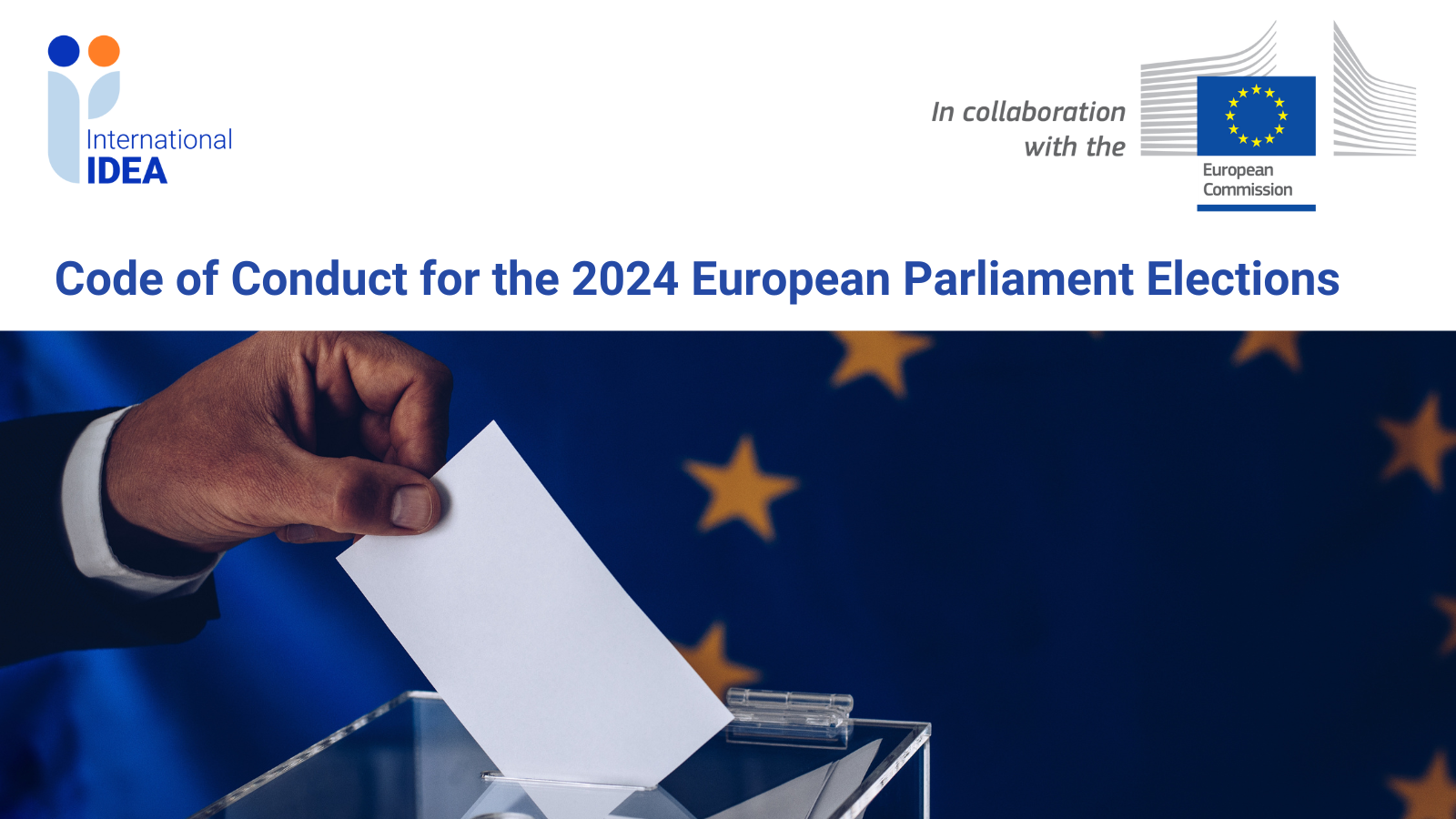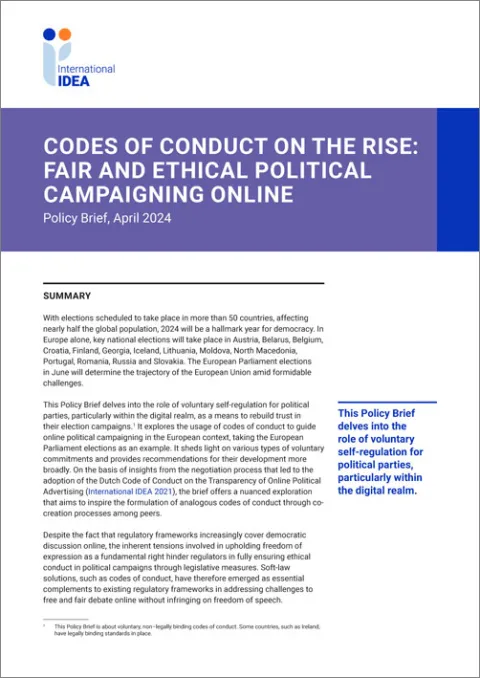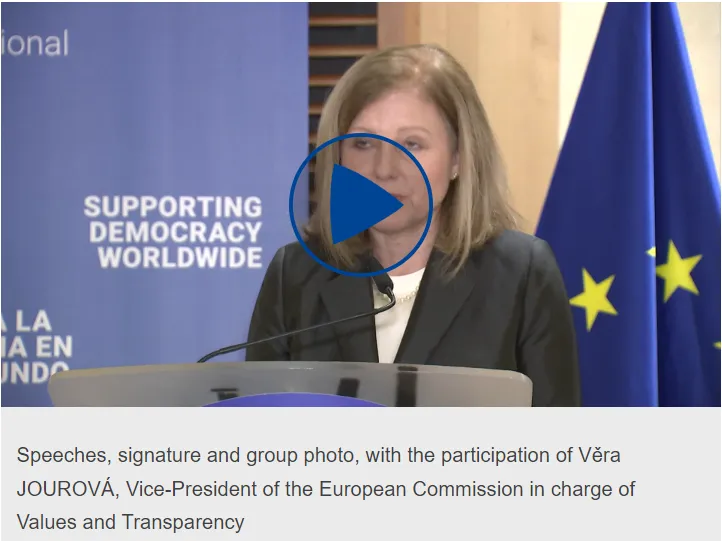Code of Conduct for the 2024 European Parliament Elections

Signatories
The Code of Conduct in 23 languages
Sign Up
The European and national political parties listed below jointly commit to maintaining the integrity of the 2024 European Parliament elections and upholding key values like integrity, transparency, privacy, safety, fairness, and a level playing field in the elections. They signed the below Code of Conduct including 14 commitments which draw from the Commission Recommendation on inclusive and resilient electoral processes in the Union and enhancing the European nature and efficient conduct of the elections to the European Parliament (2023, point 11) and the Dutch Code of Conduct on Transparency of Online Political Advertising 2021].
The Code of Conduct was signed by European political parties on 9 April 2024 and is open for additional endorsements from national political parties (contact provided below).
Commitments
CODE OF CONDUCT FOR THE 2024 EUROPEAN PARLIAMENT ELECTIONS
This Code of Conduct for the 2024 European Parliament elections was developed by the International Institute for Democracy and Electoral Assistance (International IDEA) in collaboration with the European political parties and the European Commission to support the follow-up by European and national political parties to point 11 of the Commission Recommendation (EU) 2023/2829 on inclusive and resilient electoral processes in the Union presented in the framework of the Defence of Democracy Package by the Commission on 12 December 2023.
The commitments are triggered by the relevant recommendations in the Recommendation on inclusive and resilient electoral processes in the Union. They also draw from other experiences such as the Dutch Code of Conduct on Transparency of Online Political Advertising concluded ahead of the parliamentary elections in The Netherlands in 2021.
Introduction
Through this code of conduct, European political parties and any member parties signing up to it commit to maintaining the integrity of the 2024 European Parliament elections, aligning with the recommendation to adopt campaign pledges and codes of conduct on election integrity and fair campaigning in the Commission Recommendation on inclusive and resilient electoral processes in the Union and enhancing the European nature and efficient conduct of the elections to the European Parliament (2023).
By following this code, the signatories uphold key election values like integrity, transparency, privacy, safety, fairness, and a level playing field.
They recognize the vital role of political parties in safeguarding these values. Transparency empowers citizens to make informed decisions based on reliable information.
Disinformation and manipulated content threaten free and fair elections. Signatories commit to the principles of truth and accuracy in their communication strategies and to countering mis- and disinformation in elections.
The signatories are committed to preventing the deliberate deception of the public, including through the use of artificial intelligence, strengthening the integrity of European elections, and supporting trust in democracy.
The pledges help to safeguard European elections against undue interference or manipulation by setting minimum standards for ethical campaigning, increasing public access to relevant campaign information, and improving cybersecurity and digital hygiene measures throughout internal party mechanisms.
This code of conduct covers different aspects of political campaigning, applicable to both online and offline activities, and to both paid and unpaid content and communication.
Parties are encouraged to promote compliance with the code internally and encourage their members to sign on to or observe the commitments in their election campaigns. The code will be made available online to help facilitate oversight by media, researchers, voters, and European citizens broadly in tracking compliance with the commitments.
Legal framework
This code of conduct is voluntary and does not intend to affect the existing legal framework or interfere with compliance with it by its signatories or other stakeholders. It is however part of the broader legal and policy frameworks at various governance levels and aims at supplementing them. This code of conduct should therefore be read in accordance with relevant national and European legislation.
Commitments
The signatories of this code of conduct, representing European political parties or any member parties signing up to it, jointly commit to:
1. Maintain the integrity of elections by complying with existing rules and norms and adhering to the principles of fair campaigning and financial transparency.
2. Encourage inclusive political discourse and participation and contribute to safe electoral processes, in particular by:
a. refraining from producing, using or disseminating discriminatory statements and biases against specific groups based on their gender, racial or ethnic origin, religion or belief, disability, age or sexual orientation;
b. refraining from disseminating, posting, or promoting content that incites violence or hate speech; signatories are encouraged to firmly condemn and sanction any act of violence against candidates or elected representatives.
c. refraining from voter dissuasion or disseminating any inaccurate information on the electoral process, such as voter, voting process, and polling station information.
3. Ensure an ethical and transparent use of campaign tools and technologies, including artificial intelligence. Abstain from producing, using, or disseminating misleading content, in particular:
a. falsified, fabricated, doxed or stolen data or material;
b. Any type of deceptive content using audio, images or video and generated with or without artificial intelligence to falsely or deceptively alter or fake candidates, officials or any electoral stakeholder. The use of artificial intelligence-generated content is only permitted when clearly labelled. Using watermarking and provenance signals is encouraged;
c. fake accounts or automatic bots to manipulate voter opinions;
d. trolling, unfounded accusations or cyber-bullying;
e. content created and disseminated by actors from outside the EU other than member parties, seeking to erode European values and principles.
4. Make use of all the available resources to counter the negative effects of AI-generated deceiving content and consider staff training to this end; abstain from using personal or confidential information in AI tools, e.g., in prompts, thereby safeguarding individual privacy and security in elections; consider establishing a structured mechanism for citizens to report any concerns or misuse associated with the AI technologies.
5. Ensure transparency of received financial contributions, including benefits in kind such as gifts and hospitality received, loans, donations, campaign contributions and expenditure to be in line with the applicable European and national legislation.
6. Ensure transparency of political advertising and campaign messages:
a. Refrain from running political ads sponsored by undeclared interests or otherwise engaging intermediaries to place campaign messages without attribution.
b. Adhere to online platforms’ transparency policies and mechanisms and provide faithful information for registration and verification processes.
c. Provide information, preferably on political party websites:
i. on affiliated organizations and foundations; or on other legal entities campaigning on their behalf with over 5 per cent campaign budget;
ii. on their use of political advertising including on sponsors, sources of funding and amounts spent;
iii. on targeting of advertising and any use of artificial intelligence systems in the dissemination of advertising.
d. Refrain from manipulative tactics, techniques, and procedures to amplify political messages and from using sensitive data for microtargeting. Ensure that data used for political campaigning strictly adheres to the European Union's General Data Protection Regulation (GDPR), with an emphasis on data minimization and lawful, fair, and transparent processing of data.
7. Proactively avoid amplification of narratives lead by entities and actors from outside the EU other than member parties, especially when those seek to erode European values and principles.
8. Take active steps to pursue minimum standards on cybersecurity, to recognize, deter and prevent attacks, distribute information, including internal trainings on cybersecurity risks in elections.
9. Remove or ask to remove without delay any content placed on behalf of the signing party that violates the commitments in this code of conduct. Report such content to online platforms.
10. Raise awareness on the code of conduct internally and promote compliance among campaign staff, party sections and other bodies, and affiliated institutions. Encourage members to sign up to or observe the commitments in this code of conduct.
11. Ensure that campaign staff and party sections strictly adhere to European and national regulations to prevent the misuse of public resources in the context of elections; raise awareness of party members on the need to strictly adhere to such regulations.
12. Promote independent observation of the commitments laid down in this code of conduct and cooperate fully with oversight authorities, international election observers and other actors engaged in independent observation of the commitments such as media, academic researchers, and civil society organizations.
13. Discuss implementation of this code of conduct between European political party presidents and/or secretary-generals and directors.
14. Conduct a post-election review and continue the discussion between and within European political parties after the European Parliament elections.
23 Language versions
Download the Code of Conduct in English text (PDF), Spanish text (PDF) and French text (PDF)
For the Code of Conduct in other languages, please view the European Commission page.
Signatories
European political parties
- Alliance of Liberals and Democrats for Europe (ALDE Party)
- European Christian Political Movement (ECPM)
- European Conservatives and Reformists Party (ECR Party)
- European Democratic Party (EDP)
- European Free Alliance (EFA)
- European Green Party
- European People’s Party (EPP)
- Identity and Democracy Party (ID Party)
- Party of European Socialists (PES)
- Party of the European Left (EL Party)
National political parties
- Christian Democrats in Finland (KD)
- Free Voters in Germany (FREIE WÄHLER)
- Conservative People’s Party in Denmark (KF)
- The Greens in Finland (De Gröna)
- The Labour Party (Ireland)
- Social Democratic Party in Sweden
- Social Democratic Party in Finland
Contact us to sign up
Please contact us if your political party would like to sign the Code of Conduct for the 2024 European elections.
Articles, Events and Publications
Contacts


More information
Our funding and other types of contributions come from our Member States and other financial partners. Become our partner and learn more about how we can jointly undertake actions in Value for Partnership.




